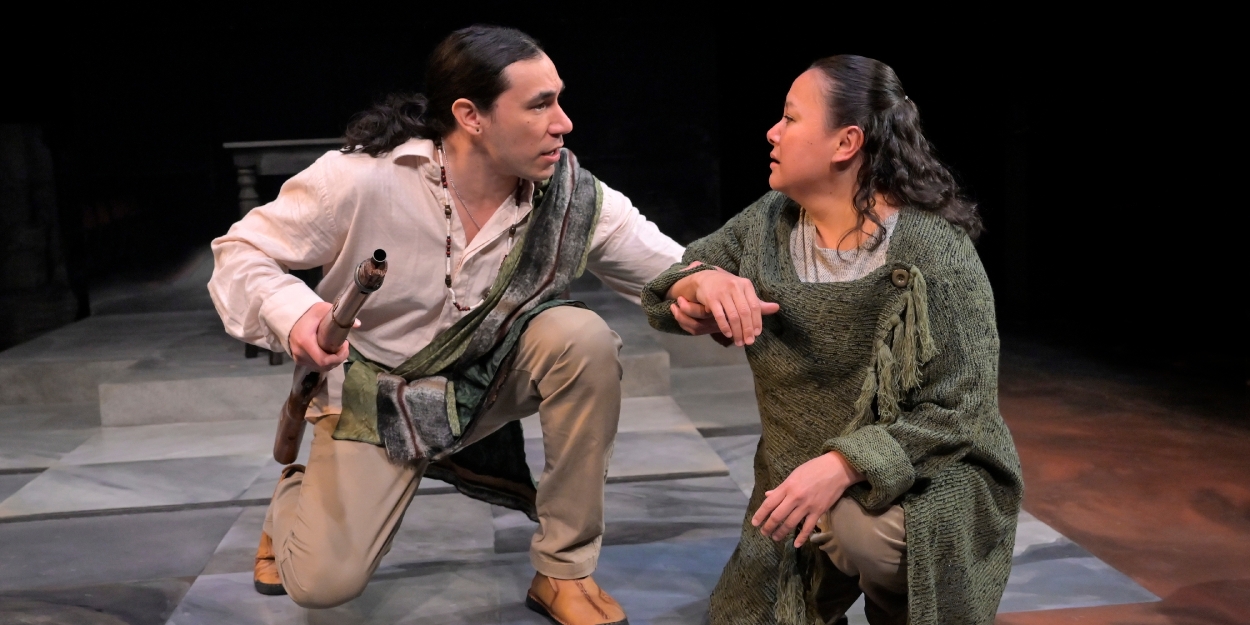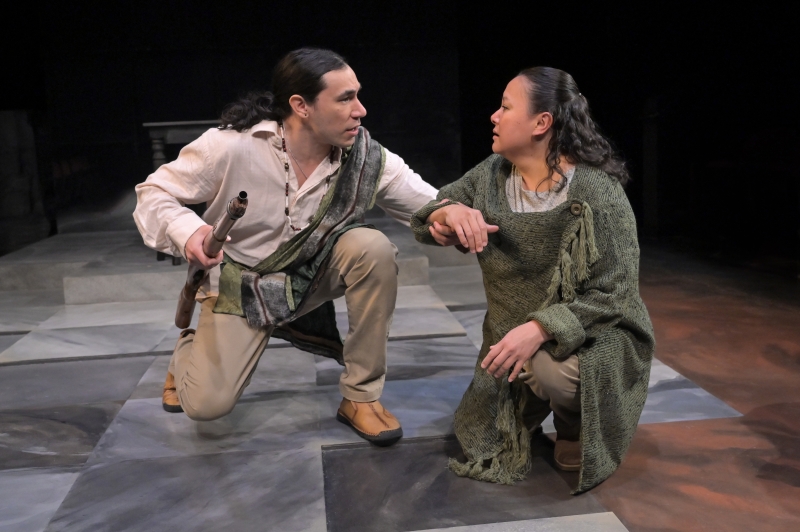Review: MANAHATTA at Aurora Theatre Company
Now through March 10th.


at Aurora Theatre Company.
Photo Credit: Kevin Berne
MANAHATTA is like a storm that washes away all pretense and excuses leaving only the truth. Using a narrative of two parallel stories, Mary Kathryn Nagle weaves a story that reveals how little we have learned from our past. Using eloquence, humor, and bravado with equal skill, the show guides the audience through a personal experience of a larger event. The result is at once mesmerizing and heart-breaking.
MANAHATTA follows two stories separated by centuries but unified by the same twin devils of willful ignorance and greed. In the early 17th century, Manhattan was known as Manahatta by the local Native people, the Lenape. The Dutch West India Company established trade with the Lenape but soon wanted more. The trade of prize tulips had become inflated beyond any inherent value of the product and when the trade bubble burst, many were left in great debt. They saw Manahatta as a means to regain their wealth and used deceit and manipulation to achieve their goals. In the 21st century a similar scenario existed in the American housing market with financial institutions located in modern day Manhattan using short sales on securities to inflate prices ultimately leading to a housing crisis. Once again, greed and false promises led many to lose their homes. The Lenape, now residing in Oklahoma, were once again challenged to secure their future and maintain their culture in the face of an economic system based on exploitation.
Playing characters from both storylines, the cast creates a strong ensemble that underscores the repetition of harm and misunderstanding. Livia Gomes Demarchi as Le-le-wa’-you and Jane is the one most clearly bridging the two cultures and seeking to understand both sides. She presents the push and pull, the allure and distaste thrust upon her as she attempts to live in both worlds. She negotiates these contradictions and yet gives both of her characters a sense of grace. Ixtlán as Se-ket-tu-may-qua and Luke is often the voice or the stern face of the truth. His quiet strength is like a rhythm in his breath which signals a sense of safety to those around him. His immovable countenance and silence speak volumes at crucial junctures of the show. Anthony Fusco might very well be a nice guy, but in this show, he oozes with such disdain and condescension for the Native peoples that his mere presence on stage causes a rock in my stomach. Both Peter Minuit and Dick are lost to their greed, and Fusco demonstrates how this pursuit of wealth has robbed them of their humanity. Max Forman-Mullin as Jakob and Joe gives us the important lesson of those who see evil and do nothing. By not contesting the early violations, both of his characters find themselves too far down the road to make a change. The swallowing of his discomfort is palpable and a true turning point. Forman-Mullin chooses poorly and ultimately breaks our hearts by the steeling of his own.
Director Shannon R. Davis brings the story to life and blends the two narratives into a whole. The way that scenes bleed into each other creates a sense of foreboding and highlights the similarities of the stories. The pacing is brisk and the lack of an intermission is a nonfactor as you do not want to move. Playwright Mary Kathryn Nagle cleverly uses identical lines in both stories to underscore how history has repeated itself. The collaboration of Lighting Designer Ray Oppenheimer, Video Designer Wolfgang Wachalovsky, and Scenic Design Deanna L. Zibello creates a space that is dynamic, flexible, and evocative. Even within a thrust stage, every vantage point has interest and movement. The costume design of Asa Benally allows the actors to flow between to the two timelines without having to leave the stage. The multiple ways the scarves are used add a layer of connection between the people of the two stories. Joy Gonzalez’s plan for props gives the actors just enough to do to keep the scenes in the moment without burdening them with too much to move on and off. The balance of the artistic team results in a show that does not vary from its purpose.
MANAHATTA is a show that reveals its own import simply through its storytelling. It is almost devoid of exposition as none is required. The truths it reveals are not in shades of gray but clearly demonstrate what happens when greed is chosen over people. The show does not attempt to offer a resolution or a quick fix but rather allows each individual to sit with their discomfort in the hopes that acknowledging and accepting the truth will be the first step toward healing, and more importantly, not repeating the cycle again. MANAHATTA is a balm for our greed-riddled world.
Reader Reviews
Videos

